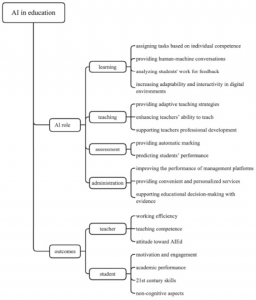I finally stepped into the role of moderator for our group’s exploration of “Design for online and blended learning“, which was both exhilarating and enlightening. Collaborating with my fellow teammates, I embarked on a journey of creativity and productivity that ultimately led us to craft a preliminary online course, a testament to our collective efforts and ingenuity.
Our journey began with the scenario of crafting a course primarily conducted online, leveraging the potential of AI in a constructive/positive manner. This prompted us to delve into a multitude of pertinent issues, each deserving careful consideration. Through spirited discussions and brainstorming sessions, we meticulously designed an online course that encapsulated a diverse array of topics and modules. The culmination of our efforts resulted in the creation of a sample course, which we proudly showcased on the AI-enabled platform Coursebox.
The course, available at https://my.coursebox.ai/courses/46038/about, stands as a tangible manifestation of our collaborative endeavor. However, it also serves as a starting point for further exploration and discourse. As I reflect on this experience, several themes pique my interest as a burgeoning faculty member with a keen focus on end-user responses to innovative technologies.
(1) The role of AI in education
The role of AI in education emerges as a pivotal area of inquiry. Inspired by the ONL course, I delved into an array of research articles, notably Chiu’s (2023, 2024) comprehensive framework delineating the multifaceted roles and outcomes of AI applications in education. This exploration has sparked my curiosity and fueled my desire to delve deeper into the transformative potential of AI in the realm of education.

Figure 1. The role and outcomes of AI application in education, adapted from Chiu (2024; 2023)
(2) Innovative learning approaches integrating AI applications
I am also quite drawn to innovative learning approaches that seamlessly integrate AI applications. As technology continues to evolve, there exists a wealth of untapped potential in harnessing AI to enhance the learning experience, a prospect that both intrigues and excites me. I am such a new teacher and still in the process of equipping myself with conventional teaching approaches to engage my students, I would be more than happy to learn more pedagogical aspects and innovative learning and teaching approaches that integrate AI applications.
(3) AI literacy
The “aesthetics” assessment of AI-generated products. In tandem with this, the concept of AI literacy emerges as a pressing consideration. As educators, it is imperative that we equip ourselves and our students with the necessary skills to navigate the increasingly complex landscape of AI technologies. Moreover, the notion of “aesthetics” assessment of AI-generated products resonates deeply, prompting critical reflection on the ethical implications of AI utilization in educational settings.
(4) Ethics and Boundaries of Using AI
Indeed, ethics and boundaries loom large in discussions surrounding the use of AI in education. As stewards of knowledge, I strongly believe that we must tread carefully, ensuring that our utilization of AI remains ethical and aligned with our educational objectives. Of course, having knowledge about the benefits and dangers of AI is definitely important, as well as dos and don’ts using AI.
(5) Using AI Positively for Teaching and Learning
I am also interested in the transformative potential of AI in the realm of teaching and learning. By leveraging AI in a positive and purposeful manner, we have the opportunity to revolutionize education, empowering learners and educators alike to thrive in an increasingly digital world. As I continue to navigate this dynamic landscape, I am filled with a sense of optimism and excitement for the boundless possibilities that lie ahead. But this is still an adventure.
In an age full of AI, ask more, think more, and reflect more.
References
Chiu, T. K. F. (2024). Future research recommendations for transforming higher education with generative AI. Computers and Education: Artificial Intelligence, 6, 100197. https://doi.org/10.1016/j.caeai.2023.100197
Chiu, T. K. F., Xia, Q., Zhou, X., Chai, C. S., & Cheng, M. (2023). Systematic literature review on opportunities, challenges, and future research recommendations of artificial intelligence in education. Computers and Education: Artificial Intelligence, 4, 100118. https://doi.org/10.1016/j.caeai.2022.100118